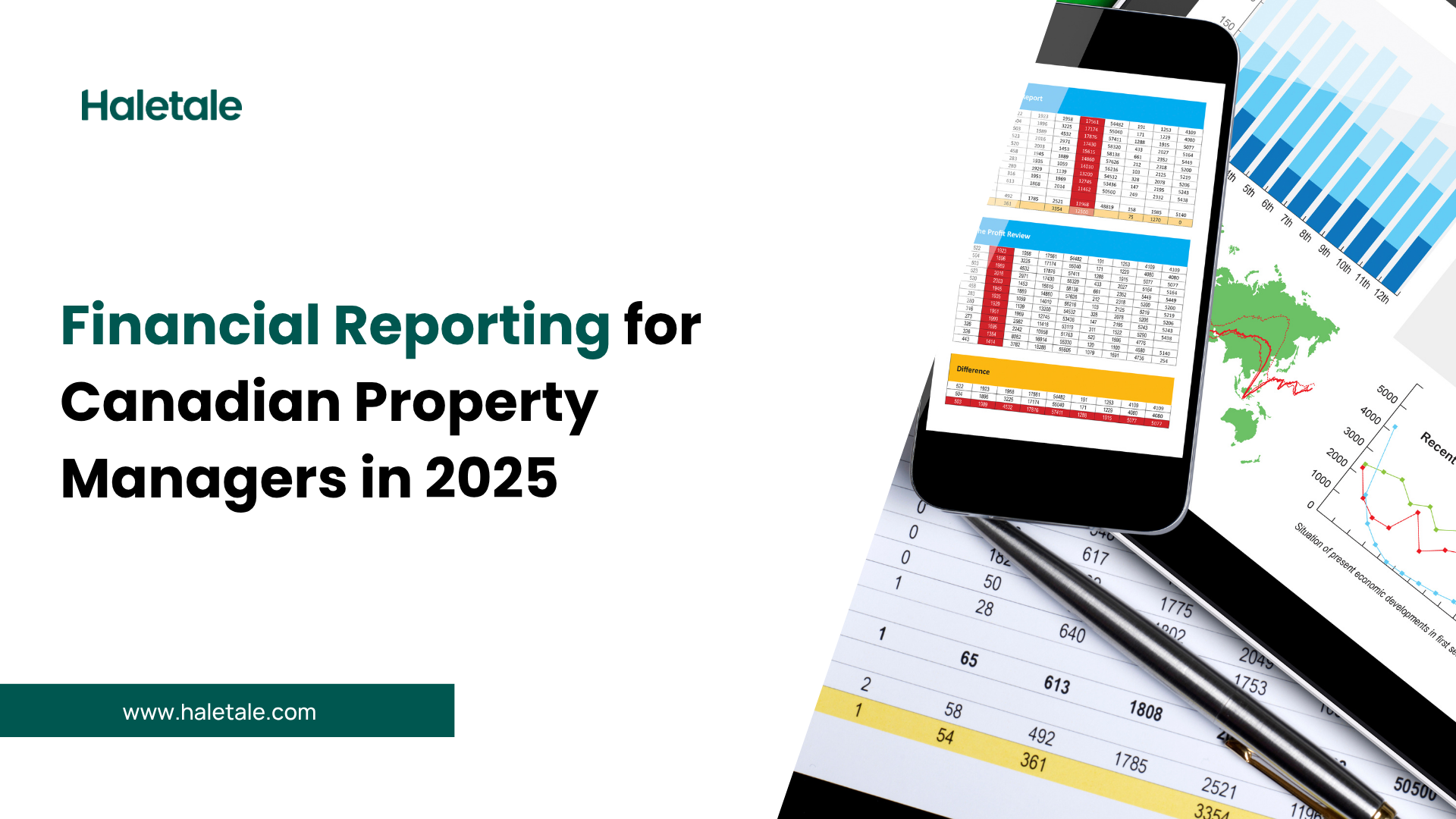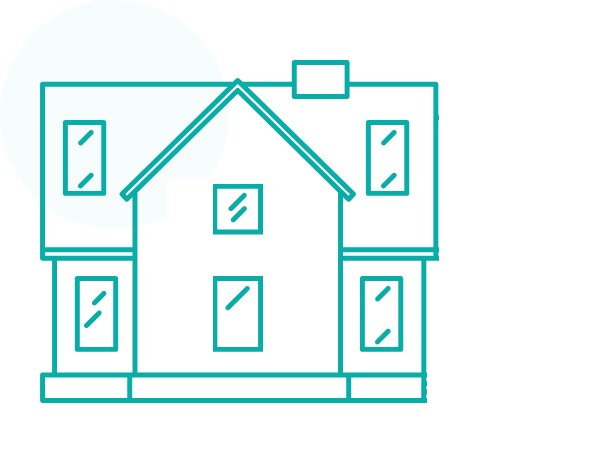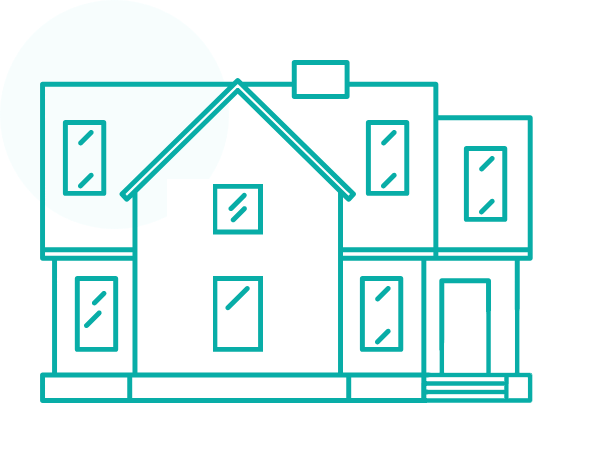T776 & Tax Filing for Canadian Property Managers in 2025
Canadian landlords typically spend $1,500-4,500 annually on accountants to organize receipts, complete T776 forms, and calculate Capital Cost Allowance. Haletale reduces these costs by 80% through automated expense tracking by property and building, one-click T776-ready reports, built-in CCA tracking, and automated financial statements. Your accountant spends 2-3 hours on strategic tax planning instead of 10-15 hours on data entry—saving you $3,000+ while ensuring every CRA-approved deduction is captured and you remain fully compliant with 2025 tax rules.
How Property Management Software Saves $3,000 in Accountant Fees
Tax season. Those two words probably make most Canadian property managers break into a cold sweat. The endless pile of receipts, the confusing Capital Cost Allowance calculations, Form T776 staring back at you with its dozens of expense categories, and the nagging fear that the CRA might question your deductions—it’s overwhelming.
But here’s the reality in 2025: managing your rental property finances doesn’t have to feel like navigating a minefield. With the right tools and systems, you can transform tax season from a nightmare into a straightforward process that actually saves you money.
The True Cost of Manual Accounting
Before we discuss solutions, let’s examine what inadequate financial tracking actually costs Canadian property managers. According to real estate tax experts, trying to manage finances with spreadsheets becomes unmanageable as portfolios grow—things fall through the cracks, mistakes get made, and even a misplaced decimal can wreak havoc on your year-end profit and loss.
The bigger issue? Missed deductions. Without proper tracking throughout the year, you’re likely leaving hundreds or thousands in legitimate tax savings unclaimed. And when April 30th rolls around, you face a choice: spend countless hours reconstructing your financial year, or pay an accountant premium rates to sort through the chaos.
What’s Changed in 2025: Critical Updates for Canadian Landlords
This year brings significant changes that make organized financial reporting more important than ever for Canadian property owners.
Short-Term Rental Crackdown
Starting in 2024 and now fully active in 2025, non-compliant short-term rental owners cannot claim any rental expenses or Capital Cost Allowance. If your Airbnb or short-term rental isn’t legally registered with your municipality, you must report 100% of rental income without any deductions—leading to a significantly higher tax bill.
This change impacts thousands of short-term rental hosts across Canada. If you’re operating a vacation rental, ensuring compliance with local licensing requirements isn’t just about avoiding municipal fines—it’s essential for claiming your tax deductions.
CRA Audit Increases
CRA data shows property income audits increased by 9% in 2024, with particular focus on short-term rentals and improper deduction claims. The CRA is paying closer attention to rental income than ever before, using sophisticated systems to cross-reference information and identify discrepancies.
Capital Cost Allowance Updates
Rental assets (other than buildings) purchased from 2022 to 2024 and available for use before 2025 may be designated as immediate expensing properties (DEIP), allowing 100% CCA rates to be claimed in the year of acquisition. However, these claims are still limited by rental loss restrictions—you cannot create or increase a rental loss with DEIP claims.
Understanding Form T776: Your Rental Property Report Card
Form T776, the Statement of Real Estate Rentals, helps you calculate rental income and expenses for tax purposes. While the CRA accepts other financial statements, they encourage landlords to use Form T776. Think of it as your rental property’s financial report card—it shows the CRA exactly what you earned and spent.
The form requires you to report:
- Gross rental income (Line 8141) – All rent received in cash or by cheque
- Income paid in kind (Line 8230) – Services or goods received instead of rent
- All deductible expenses – Categorized across multiple lines
- Capital Cost Allowance – Depreciation on your rental property and assets
- Net rental income or loss – What flows to your personal tax return
Getting T776 right means paying the correct amount of tax—no more, no less. Get it wrong, and you either overpay or risk CRA scrutiny. You can read more about net rent vs gross rent here.
The Canadian Landlord’s Tax Deduction Checklist
The CRA categorizes expenses as either current expenses (fully deductible in the year incurred) or capital expenses (depreciated over time through Capital Cost Allowance). Understanding this distinction is crucial for maximizing your deductions.
Current Expenses (Fully Deductible)
These everyday costs for maintaining and operating your property include:
- Advertising – Marketing costs to find tenants
- Insurance – Property, liability, and fire insurance premiums
- Interest and bank charges – Mortgage interest (often your largest deduction) and loan interest
- Professional fees – Accounting, legal, and property management fees
- Property taxes – Municipal and provincial property taxes
- Maintenance and repairs – Fixing things to maintain original condition
- Utilities – Heat, electricity, water when paid by landlord
- Office expenses – Supplies, postage, stationery
- Travel – For 2025, travel expenses are only deductible if you own more than one rental property and must travel between them for maintenance or management. General oversight travel for a single property is not deductible
Capital Expenses (Depreciated Through CCA)
Major improvements that add value or extend property life must be depreciated over time:
- Building depreciation at 4% annually for residential rental properties
- Major renovations (new kitchen, bathroom remodel)
- Roof replacement
- HVAC system installation
- Structural improvements
Important: Property managers cannot claim CCA if it results in a rental loss. CCA can only reduce rental income to zero, not below. This rule applies across all rental properties you own.
The Principal Residence Warning
If you rent part of your principal residence, claiming CCA can cause issues with your principal residence exemption when selling. Use caution when claiming CCA on any property you might designate as your principal residence.
Common Accounting Mistakes That Trigger CRA Audits
Even experienced property managers make costly errors when managing finances manually. Here are the pitfalls to avoid:
Inconsistent Record-Keeping
Things fall through the cracks with spreadsheets, mistakes get made, and even something as simple as a misplaced decimal can wreak havoc on end-of-year profit and loss statements. Manual entry errors compound over time, making your financial reports unreliable and suspicious to the CRA.
Misclassifying Expenses
Mixing up repairs (immediately deductible) and capital improvements (depreciated over time) is a typical audit trigger for the CRA. Fixing a leaky tap? Repair. Renovating an entire bathroom? Capital improvement requiring CCA.
Missing Documentation
The CRA recommends keeping detailed records of all claimed expenses, including receipts, invoices, and contracts, for at least six years after the end of the tax year. Without proper documentation, claims can be disallowed, leading to penalties.
Unreported Income
The CRA actively monitors rental income through third-party reporting from banks, monitoring real estate transactions, cross-referencing with tenants’ tax returns when they claim rent-related tax credits, and regular audits. Failing to report rental income constitutes tax evasion and can result in substantial fines, penalties, and interest.
Non-Compliant Short-Term Rentals
The CRA has introduced significant changes denying income tax deductions for expenses related to non-compliant short-term rentals effective for tax years after 2023. These properties either operate where short-term rentals are prohibited or fail to comply with provincial or municipal registration requirements.
How Property Management Software Changes Everything
Modern property management software transforms Canadian property managers relationship with tax season. Instead of drowning in paper receipts and manual calculations, imagine a system where:
Expense tracking happens automatically. Every payment gets categorized correctly from the start—sorted by property, by building, by expense type. The system knows the difference between repairs and capital improvements, ensuring your T776 form is accurate.
Income tracking is effortless. Rent payments, damage deposits, additional fees—everything flows into your system automatically, properly categorized for CRA reporting.
T776 forms practically complete themselves. All your rental income and expenses are organized throughout the year, so generating your Statement of Real Estate Rentals becomes a matter of clicking a button.
CCA calculations are built-in. The complex half-year rule, class assignments, and depreciation schedules are automated, eliminating one of the most challenging aspects of landlord accounting.
Reports generate on demand. Need monthly statements for cash flow monitoring? Quarterly reports for investors? Annual reports for your accountant? Generate them instantly.
How Haletale Simplifies Canadian Property Accounting
Haletale’s financial reporting system delivers professional-grade accounting without requiring accounting expertise. Here’s how it works for Canadian landlords:
Smart Organization by Property and Contact
Instead of one messy financial bucket, Haletale organizes everything by:
- Individual properties – Track each unit’s performance separately
- Buildings – See aggregate performance for multi-unit properties
- Landlord and homeowner contacts – Manage owner information alongside financial data
This granular organization means you always know exactly which property is profitable and which needs attention. Come tax time, pull reports for specific properties or view your entire portfolio.
Professional Reports Without Professional Fees
Haletale offers:
Profit & Loss Statements showing rental income minus expenses for any period. These reports break down where money comes from and where it goes, helping you identify opportunities to increase profitability.
Balance Sheets providing snapshots of your financial position—assets, liabilities, and equity—essential for securing financing or evaluating investment performance.
T776-Ready Reports with all information pre-organized in CRA-approved categories, making form completion straightforward.
Custom Time Frames allowing monthly reports for routine monitoring, quarterly reports for owner updates, or annual reports for tax preparation.
The beauty of automated reporting is consistency. Every report follows the same format, uses the same categorization rules, and maintains the same level of detail—exactly what accountants love and the CRA expects.
The Real Value: Time and Money Saved
Let’s do real math on savings. Typical accountants charge $150-300 per hour. If they spend 10-15 hours sorting disorganized receipts, categorizing expenses, calculating CCA, and preparing T776 forms, you’re looking at $1,500-4,500 in fees.
Now imagine handing your accountant a complete, organized package:
- All income properly documented by property
- All expenses tracked with digital receipts attached
- Profit and loss statements for each property
- CCA schedules maintained automatically
- T776 forms ready for review
Your accountant’s job becomes verification and strategic planning rather than reconstruction. This reduces their time to 2-3 hours of actual work, saving you thousands while ensuring nothing gets missed.
Special Considerations for Canadian Landlords
Rental Income vs. Business Income
The CRA distinguishes between “income from property” (rental income reported on T776) and “business income” (reported on T2125). If you provide only basic services like heat, parking, and laundry, it’s rental income. If you offer additional services like regular cleaning, security, or meals, the CRA may classify it as business income.
This distinction matters because business income has different reporting requirements and may allow for different deductions.
Co-Ownership and Partnerships
If you co-own rental property with friends or family, the CRA considers you partners. Each partner reports their proportional share of rental income on their personal return. You may need to file Statement of Partnership Income (T5013) based on revenues and other criteria.
Provincial Variations
While federal rules apply across Canada, be aware of provincial programs that may affect your tax situation. For example, British Columbia offers a renter’s tax credit with an adjusted income threshold that’s indexed to inflation—$64,764 for 2025.
Tax Season Strategy: Starting Strong
The best time to prepare for tax season is now, not next April when deadlines loom. Here’s your action plan:
Set up your system today. Whether starting your first rental or managing a growing portfolio, establish your financial tracking system immediately. Input current properties, set up vendor contacts, and begin categorizing every transaction.
Track everything in real-time. Make it habit to enter expenses when they occur. Photograph receipts immediately after purchases. Log contractor payments right after writing cheques.
Review monthly reports. Don’t wait until year-end. Monthly reviews help spot issues early, adjust strategy, and make better decisions about rent rates and property improvements.
Maintain supporting documentation. Keep detailed records including receipts, invoices, and contracts for at least six years. The CRA can request documentation during this period.
Meet with professionals strategically. When your books are organized and reports are accurate, meet with tax professionals during their slower seasons for strategic planning rather than crisis management.
The Audit-Proof Advantage
Nobody wants a CRA audit, but being prepared provides peace of mind. Having comprehensive records helps substantiate reported figures in case of audit, reducing risk of additional taxes or penalties.
With organized, automated financial reporting, you have:
- Digital receipts attached to every expense
- Transaction histories showing payment details
- Categorization logic explaining expense classifications
- Consistent reporting demonstrating systematic record-keeping
- Audit trails showing who made changes and when
This documentation level transforms audits from nightmares into manageable inconveniences. You’re not reconstructing your year—you’re simply sharing organized records maintained all along.
Looking Ahead: Building Long-Term Success
Good financial reporting isn’t just about surviving tax season—it’s about building a successful, scalable rental property business. With reliable financial data, you can:
- Make confident pricing decisions based on true costs and profitability
- Identify underperforming properties and take corrective action
- Project future cash flow accurately
- Secure better financing by demonstrating professional financial management
- Scale your portfolio without drowning in administrative complexity
- Make data-driven investment decisions about property acquisitions
The Bottom Line
Tax season doesn’t have to be stressful and expensive. With Haletale’s simplified financial reporting system, you get professional-grade accounting without needing accounting expertise. Track income and expenses by property, generate T776-ready reports with one click, automate CCA calculations, and produce monthly, quarterly, or annual financial statements.
The result? More time for growing your business, less money on accounting fees, fewer headaches during tax season, and complete confidence that you’re capturing every CRA-approved deduction while staying compliant with 2025 requirements.
Stop paying premium rates for accountants to sort through financial chaos. Stop worrying about missed deductions and CRA audits. Stop dreading tax season.
Start using tools designed specifically for Canadian landlords—tools that understand T776 requirements, CCA calculations, and CRA compliance. Your future self (and your accountant) will thank you.
Ready to simplify your property accounting and save thousands in fees? The best time to start is now, before receipts pile up and another tax season catches you unprepared.
Frequently Asked Questions
Q: Do I really need property management software if I only have one or two rental properties?
A: Absolutely. Even small landlords and property managers benefit significantly from organized financial tracking. The T776 form requires detailed categorization of expenses, and manual tracking often leads to missed deductions. Software ensures nothing falls through the cracks and makes CCA calculations manageable from day one. Plus, if you expand your portfolio later, you’ll already have systems in place.
Q: What’s the difference between a repair and a capital improvement for Canadian tax purposes?
A: Repairs restore your property to its original condition and are fully deductible in the year you pay for them (fixing a leaky faucet, patching drywall, replacing broken appliances). Capital improvements add value, extend the property’s useful life, or adapt it for new use, and must be depreciated through CCA over multiple years (renovating a kitchen, replacing a roof, adding a deck). Mixing these up is a common CRA audit trigger.
Q: Can I claim Capital Cost Allowance on my rental property?
A: Yes, but with important restrictions. You can claim CCA at 4% annually on the building portion of residential rental properties (excluding land value). However, you cannot claim CCA if it creates or increases a rental loss—it can only reduce rental income to zero. Also, if you rent part of your principal residence, claiming CCA may affect your principal residence exemption when you sell.
Q: What happens with my short-term rental in 2025?
A: If your short-term rental (Airbnb, VRBO, etc.) isn’t compliant with local licensing and registration requirements, you cannot claim any rental expenses or CCA for 2025. You must report 100% of rental income without offsetting deductions. Ensure you have all required municipal permits and registrations before claiming any deductions on short-term rentals.
Q: How long should I keep rental property financial records?
A: The CRA recommends keeping all rental income and expense records for at least six years after the end of the tax year. For properties where you’ve claimed CCA, keep records for at least three years after you dispose of the property. Digital storage through property management software makes this easy without physical file cabinets.
Q: Can I avoid hiring an accountant entirely?
A: While we don’t recommend skipping professional tax advice, organized software dramatically reduces what you pay for. Instead of paying an accountant to spend hours on data entry and categorization, you hand them clean reports and they focus on strategic tax planning and optimization. That’s where the $3,000+ savings comes from—you’re buying their expertise, not their clerical time.
Q: What rental expenses am I probably forgetting to deduct?
A: Common missed deductions include advertising costs for finding tenants, property management software subscriptions, bank service charges, credit card processing fees, home office expenses (if you manage properties from home), professional development courses, and travel between multiple properties. All these are legitimate deductions if properly documented.
Q: What if the CRA audits me?
A: With digital records, proper categorization, and receipts for every transaction, a CRA audit becomes much less stressful. You’re not reconstructing your year from memory—you’re sharing organized documentation maintained throughout the year. This is why automated systems provide such peace of mind. The CRA is much more concerned with landlords who have incomplete or inconsistent records.
Q: How does Haletale handle multiple properties differently than spreadsheets?
A: Haletale tracks each property’s performance separately while providing consolidated portfolio views. You can generate T776 forms for individual properties, building-level reports, or entire portfolio summaries with one click. Spreadsheets require manual consolidation, are prone to formula errors as you scale, and don’t provide the automated categorization and CCA calculations that tax filing requires.
Disclaimer: This article provides general information about rental property accounting and Canadian tax requirements. Tax laws are complex and vary by province and individual circumstances. Always consult with a qualified tax professional or accountant for advice specific to your situation.









